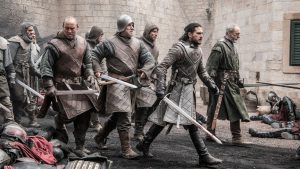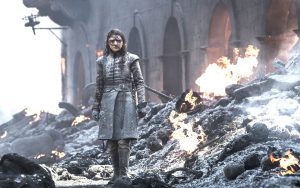Game of Thrones 8, Episode 5 – The Bells. Tidying up.
In this 5th, penultimate episode, the plot is brought nearer and nearer to the central conflict over the throne and the reign over the continent. As in a good Shakespeare history play, at the end of the story there will inevitably (only) be the one left who can initiate the new phase of the story, and, if one is lucky, some of its closest associates will survive. For the sake of dramaturgical balance, at the end of the series, this would have to be primarily the second generation of the Starks. Besides, it is also necessary to conclude further secondary action strands in this episode to be able to focus on the central conflict in the last episode.
The plot of this episode „The Bells“ begins on the inhospitable island where Daenerys (Emilia Clarke) was born, which also represents her character: hard stone, merciless.
The preparations for the battle against Cersei (Lena Headey) and her troops are underway, which will mark the climax of this episode and the beginning of the resolution of the conflict, the ‚catastrophe‘. So, as expected, the two women are set as antagonists for this episode. The one, Cersei, is the queen, who sees herself as the widow of the last king as a legitimate ruler. Daenerys, on the other hand, now knows that she is, in fact, the second on the list of entitled heirs to the throne of the old monarchy, but still insists on her claim to total supremacy. With this antagonistic constellation, the intrigue Cersei’s, which has initiated this season, can also be completed. Attention spoilers!
For the dramatic development of the episode, as well as the stringency of the character of Jon/Aegon (Kit Harrington), it is necessary that Jon Daenerys‘ claim continues to be accepted, she is his queen, as the character confirms twice in dialogue in the first minutes of the episode. Once opposite Lord Varys (Conleth Hill), then again opposite Daenerys himself. In dramaturgy, such a double take serves to emphasise particularly essential aspects and to ensure that this information is not lost. However, Daenerys can no longer be his mistress as his aunt, which would undermine the previous drawing of the figure in the sense of the moral code that the authors set for the series and portray it as no longer worthy of the throne.
As in so many situations before, it is the male advisors of Daenerys, not themselves, who plan the next decisive steps to bring them closer to the throne. Now it’s the battle against Cersei, hoping to get them to give up and at the same time keep Daenerys from unwise actions and thus prevent unnecessary bloodshed. Later it will be shown how Daenerys, incited by her rage, not only destroys the fleet and all the Dragon Slayer bows but completes what her father could not do at that time – the destruction of Kingslanding – after having already won a battle. By letting this figure do this, the dramatic arc to the starting situation of the entire series, but also to that of this episode, is closed at the same time. This is done by relating several storylines to each other: this is Lord Varys and his relationship to the character of Tyrion (Peter Dinklage), whose film narrator function (cf. Stutterheim 2017) has been increasingly withdrawn since the beginning of this eighth season.
Moreover, this Tyrion is no longer shown as cynically distanced, observing and cleverly recognizing connections, but as someone who has mutated into a devotee and in return, betrays one of his few real friends. For it is the figure of Varys who – as the embodiment of a more European traditional understanding – is led as the one who places the welfare of the community before individual or family ties. He has recognized – as embedded in the plot – that Jon/Aegon will be the better, caring and wiser king. Varys carefully expresses his scepticism as to whether Daenerys‘ character has not yet fully unfolded. With this foreboding, the end of this episode gets dramaturgically prepared. Since Tyrion reveals his activities to Deanery’s, Varys gets executed by the cruel Queen, an action that causes a slightly strange reaction in the face of Jon/Aegon’s character. And, it is a reminder of other cruel and stone-hearted executions by Daenerys that happened in earlier episodes/seasons.
The other narrative strand, which is indirectly brought to an end and also reflects on the execution of Ned Stark (Sean Bean) in the context of the codex inscribed in the series, is around the figure of Jaime (Nikolaj Coster-Waldau). He was the king’s guard and hindered the father of Daenerys from destroying the city and its inhabitants by ending his life. This he did, so it was expressed several times in some dialogues, out of responsibility towards his owe and the throne, thus an institution. Indirectly he has helped his sister to her powerful position. This moral code and the „American dramaturgy“, in which the family always takes precedence over the common good, are underlined once again, when the figure of Jaime does not, as I long assumed with my European view, stand up for the survival of the community following the tradition of ancient Greece drama. In the end, we understand that Jaime also places his family above all else. This secondary strand is ended by the figure of Jaime fighting heroically to reach his beloved sister with the last of his strength and to guide her at the very last moment towards the escape route organised by his brother. Paradoxically, it is precisely the escape arrangement that leads the two into the trap that has arisen from the blind rage of the character Daenerys. Thus, in this episode, the figure of Tyrion was further undermined as he caused the death of his only two friends and many people beyond – not by supporting Varys, but by acting loyally submissive to Daenerys. At the end of this episode, Tyrion is the only Lannister still alive, whose single living friend is Sansa (Sophie Turner). And Daenerys is also threatening Tyrion with death.
The fact that Jaime and Cersei do not die in battle but as a closely entwined couple as a result of the blind frenzy of the Daenerys, serves the moment of „noble kitsch“ (cf. Friedländer 2007). The sympathies become more and more shifted in this regard so that somebody at all cherished them in opposition to the mad Daenerys because the latter in the end set the well-being of the family over the last fight and thus approached the codex again.
The Hound (Rory McCann) and the Mountain (Hafþór Júlíus Björnsson), the two enemy brothers, are linked to this storyline in Kingslanding and around Cersei and also retire from the game in a deadly duel. Connected to the Hound is Arya’s storyline. In this case, she cannot carry out her long-cherished plan to kill Cersei, but of course, she survives the catastrophe she has fallen into. She will be able to testify from her own experience to what happened in the city.
The figure of Jon/Aegon is shown as a courageous and at the same time prudent commander, who almost succeeded in surrendering the city without much bloodshed, when the commander of the opposite side lays down his sword and many follow him. After a moment of waiting – for the sign of the bells – as a retarding moment, by showing Tyrion staring at the bell tower, Daenerys in the air on her dragon gazing down into the streets, Cersei looking at the city until it actually sounds and everything seems fixed. Cersei blinks down as a gesture of understanding and admitting defeat, Jon’s face seems to relax a little bit for a moment. The montage shows Tyrion looking at Daenerys, who in turn is looking at the tower in which Cersei is, until her face is grimacing and she flies away, watching Tyrion again, then we see Daenerys flying on her dragon towards the castle, Cersei observing her doing, looking at the city from above. People flee, the dragon spits fire into the streets. The armies still face each other in the cease-fire, but then the Grey Worm (Jacob Anderson) loyal to his queen throws his spear against the unarmed commander of the army of Kingslanding and another massacre breaks out (43 min). Grey Worm has nothing more to fight and live for than his loyalty to Daenerys, so he is situated to double the Daenerys character and extend her fight into the streets of the city as well. Jon/Aegon can only fight his way out and order his men out of town as quickly as possible. They run to save themselves from the dragon fire, which makes Daenerys spit blindly on their enemies as well as their friends.
This chain of events contains the moment of anagnorisis and the peripeteia associated with it. With this end, our expectation, that of the audience, is directed towards the central conflict, for the last episode will be about survival and power between these two figures. With the decision then taken, the central conflict will have to be resolved. All accompanying, still living ensemble members, who are predominantly from the Starks family, will be grouped around it.
Thus, probably in the last episode, in which the now inevitable conflict between Jon/Aegon and Daenerys will take place, an end can be reached that promises hope for the continued existence of Westeros mankind. Or, if HBO cannot resist and should plan a continuation/sequel of any kind, the existing one can be maintained or a new latent conflict established.
Of course, this solution is linked to that for Winterfell, the place where the series started out from. From a dramaturgical point of view, the action should be concluded regarding the central conflict, the question of the Grail and the rescue of the country, as well as the Stark family and Winterfell, in order to possibly be rounded off with a finale.
Kerstin Stutterheim
Bibliography
Friedländer, Saul. 2007. Kitsch and death – the reappearance of Nazism. Erw. Ausg. ed. Munich: Hanser.
Stutterheim, Kerstin. 2017 Game of Thrones – dramaturgy of a TV series. Paderborn Fink Publishers / Brill
For the basic dramaturgical concepts and their explanation see: Stutterheim. 2015. Handbook of Applied Dramaturgy. Peter Lang Verlag; or: Modern Film Dramaturgy. Peter Lang Publishing,2019.


